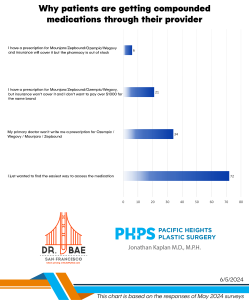The article below is being reposted in its entirety. To see the original in Modern Aesthetics magazine, click here.
As physicians pursuing cosmetic patients, we’ve become more marketing director than healthcare provider in some instances. It feels like we’re in a hamster wheel of marketing; spending money in an effort to get more traffic and more clicks to our website. So what do we have to show for it?
Are you having any luck following up on those “clicks?” Probably not. Why? Because a click is just that: a nameless push of a mouse button. A click has no identifiable information. Without contact information, we’ve accomplished nothing.
More on that in a bit.
I moved to San Francisco a little under three years ago. I was new in town; no one knew me and I had no discernable marketing budget. I knew if I were going to build a practice in this market, I would need more than just clicks. With six other plastic surgeons in the building, I knew I needed leads that contained contact information.
However, contact information from random consumers would not be adequate. I needed a lead that simultaneously gave me legitimate contact information from a qualified individual. So what makes someone qualified? They need to be a good candidate for the services I provide and they need to understand their out-of-pocket responsibility for their cosmetic procedure of choice.

Figure 1. The online price estimator in action.
From a philosophical standpoint, I believe the true, ultimate pain point for any patient considering a cosmetic procedure to be that of cost and cost alone. Certainly they need to be a good candidate for the services we provide but this isn’t the 20th century where every concern was treated with surgery. If surgery was the only option, then it’s true, not everyone would be a candidate due to health or some other comorbid condition.
But in the 21st century, we have so many surgical and non-surgical options that everyone is a candidate for something. Quite frankly, determining whether they’re a good candidate for a service or procedure is a moot point. If they aren’t a liposuction candidate, then they’re a candidate for non-surgical fat reduction. Or fat melting injections. If they aren’t a candidate for a neck lift, then they’re a candidate for a non-surgical energy-based lift. The pain point for these cosmetic patients is not their candidacy for a procedure, but their ability to pay. Cost is the only absolute pain point. All other pain points —time off work, preference of doctor—are relative inconveniences.
So I set out to provide a service on my website that didn’t rely on clicks but rather, the consumer’s pain point: cost. With a simple digital transaction, the consumer could check pricing on my website by submitting a “wishlist” along with their contact info. They received instant gratification in the form of an automated email with a cost estimate and I received the same email with their name, email address and phone number. Legitimate contact information and a qualified lead. Check and mate!
Still to this day, my office staff follows up with every single wishlist. If you’re committed to building a cosmetic practice, this follow-up time is well spent. By helping the consumer with the cost issue, you also help them make the decision of whether coming in for a consultation is a waste of their time as well as yours.
Sure there are other ways for consumers to check pricing, but those usually involve US averages that may or may not include OR and anesthesia fees (the annual American Society of Plastic Surgeon’s procedural statistics don’t include OR fees that may reflect up to half of the overall cost!). The pricing estimates consumers receive elsewhere aren’t accurate or complete, and the consumer knows that.
The only way to provide the consumer with accurate pricing information without tying up your office staff in tabulating one pricing request after another, is to upload all of your pricing to the cloud. That way, when the consumer submits a “wishlist” through a pricing tab on your site (see example on my site here), that pricing is automatically tabulated in the cloud and sent to the patient in an email. Again, this level of automaticity is second to none in streamlining front office processes.
By providing pricing on your website, you’re giving the consumer a level of information they cannot obtain anywhere else. They can’t find your specific pricing for specific services anywhere other than your website. And when you provide that level of personalized information, consumers reward you with their contact info.
DOES ONLINE PRICE TRANSPARENCY WORK?
After my first year in practice in this new locale without paid marketing, I reviewed my results. I received 412 wishlists from 208 consumers. Of those 208 consumers, 17.8 percent came in for a consultation. While it’s easy to focus on the 82.2 percent that did not come in for a consultation, that’s not a loss. I still received the contact information for those consumers who submitted wishlists and who also determined my fees were out of their budget. With their email address added to my database, I still had the option of reaching them with 12 “touch points” over the subsequent year with each of my monthly e-newsletters.
Of the 17.8 percent that came in for a consultation, 62 percent of those patients booked. When compared to patients that came in for a consultation that were not price-aware, the price-aware patients were 41 percent more likely to book a procedure. This shows the effectiveness of online price transparency combined with lead generation, even in the absence of paid marketing.
What happened when I committed a marketing budget to my price transparency efforts?
During my second year, I began paying for two channels of marketing: TV and print. By specifically promoting that I had pricing information on my website, consumers flocked to my site and started submitting wishlists to check pricing. They received price quotes and I received their contact info…to the tune of 4,156 wishlists from 2,134 consumers! Interestingly, the price-aware consumers that subsequently came in for a consultation booked a procedure 75 percent of the time as opposed to 62.2 percent of the time during the first year, prior to my paid marketing efforts.
One last statistically significant nugget: Because of my lead collection in my first year, I found that 2.8 percent of those that submitted a wishlist in the first year didn’t come in until the second year I was in practice. Maybe it was because of my monthly e-newsletters or paid marketing during that second year. Regardless, all 100 percent of those that submitted a wishlist in the first year and came in for a consultation in a delayed fashion, booked surgery. Now those are the committed, serious qualified leads I’m looking for!
DO IT RIGHT
Is online price transparency for you? It only works if done in the right way. That means that consumers only get pricing after submitting their contact info. A simple menu of procedures and prices on your site just won’t do. By combining lead generation with price transparency, you can build an email database of patients that are interested in your services when their budget intersects with the services you provide. After all, I built my database from 200 email addresses to over 5,000 in three years!
About the author:
Jonathan Kaplan, MD, MPH is a board-certified plastic surgeon based in San Francisco as well as founder/CEO of BuildMyBod Health, a price transparency-lead generation platform used by over 250 healthcare providers that offer medically necessary services that are paid out-of-pocket because a deductible has not been met, or because those services are considered cosmetic.
Click here for the original article written by Dr. Jonathan Kaplan for Modern Aesthetics.



